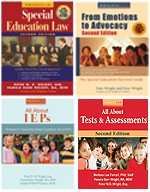What's In Store at Wrightslaw?
![]()
Special Ed Law & Advocacy Training (6.5 hrs)
25% Off the Wrightslaw Bundle of 4 PRINT books for $58.35 (Sorry, coupons not accepted on this product)
Includes Wrightslaw: Special Education Law, 2nd Ed., Wrightslaw: From Emotions to Advocacy, 2nd Ed., Wrightslaw: All About IEPs and Wrightslaw: All About Tests and Assessments, 2nd Ed.
New! The Wrightslaw Bundle is now available as an immediate PDF download. All four Wrightslaw books as PDFs for just $49.95!
![]()
I think my child may need special help in school. What do I do?
Begin by finding out more about special services and programs for students in your school system. Also find out more about the Individuals with Disabilities Education Act (IDEA). This law gives eligible children with disabilities the right to receive special services and assistance in school. These services are known as special education and related services. They can be important in helping your child at school.
What is special education?
Special education is instruction that is specially designed to meet the unique needs of children who have disabilities. This is done at no cost to the parents. Special education can include special instruction in the classroom, at home, in hospitals or institutions, or in other settings.
Over 5 million children ages 6 through 21 receive special education and related services each year in the United States. Each of these children receives instruction that is specially designed:
a. to meet the child’s unique needs
(that result from having a disability); and
b. to help the child learn the information and skills that other children
are learning.
This definition of special education comes from the Individuals with Disabilities Education Act (IDEA), Public Law 105-17.
Who is eligible for special education?
Certain children with disabilities are eligible for special education and related services. The IDEA provides a definition of a “child with a disability.” This law lists 13 different disability categories under which a child may be found eligible for special education and related services. These categories are listed in the box below.
According to the IDEA, the disability must affect the child’s educational performance. The question of eligibility, then, comes down to a question of whether the child has a disability that fits in one of IDEA’s 13 categories and whether that disability affects how the child does in school. That is, the disability must cause the child to need special education and related services.
More FAQ Sheets on FetaWeb.com
FAQs
about Special Education - What Is it? Who is Eligible?
FAQs about Your Child's
Evaluation
FAQs about Your
Child's Eligibility
FAQs about Writing IEPs
FAQs about Reevaluations
FAQs - Resolving
Disputes with the School
Wrightslaw:
From Emotions to Advocacy
For basic information about special education
and your role as an advocate for your child, read Section 1 in From Emotions
to Advocacy. You will learn about tests and how to measure progress in
Chapters 10 and 11. Chapter 12 of From Emotions to Advocacy is about SMART
IEPs.
Read Chapter 17, IDEA - Section 1414: Evaluations, Eligibility, IEPs,
and Placement.
This article is an excerpt from "Questions Often Asked by Parents about Special Education Services", NICHCY Briefing Paper LG1 (4th Edition), September 1999.
NICHCY Briefing Papers are developed in response to questions and concerns of individuals and organizations that contact the Clearinghouse. NICHCY disseminates other materials and can respond to individual requests for information.
This document was reviewed by the U.S. Office of Special Education Programs for consistency with the Individuals with Disabilities Education Act Amendments of 1997, Public Law 105-17, and the final implementing regulations published March 12, 1999.
For further
information and assistance, or to receive a NICHCY Publications Catalog,
contact:
NICHCY
P. O. Box 1492,
Washington, DC 20013
Phone: 1-800-695-0285 (Voice/TTY) and (202) 884-8200 (Voice/TTY).
Visit the NICHCY website at www.nichcy.org
or e-mail at: nichcy@aed.org
Copyright © 1998-2022, Peter W. D. Wright and Pamela Darr Wright. All rights reserved. Contact Us
